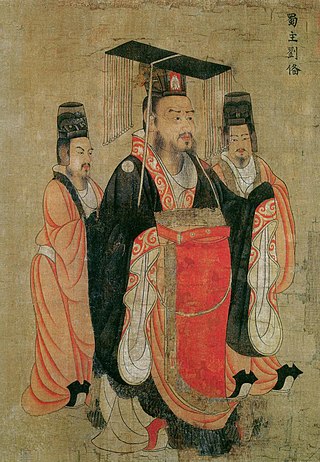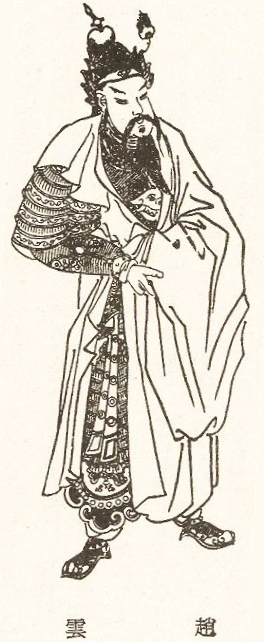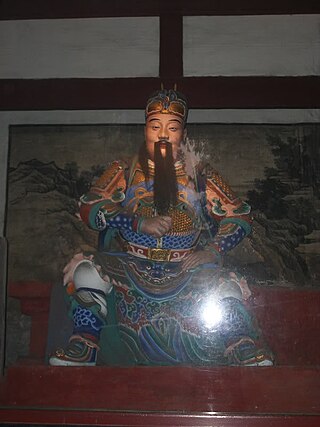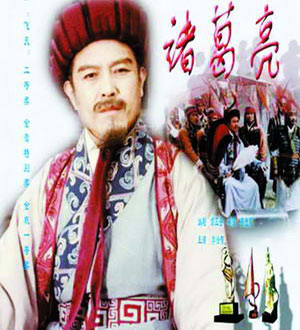
Xiahou Dun,courtesy name Yuanrang,was a Chinese military general and politician serving under the warlord Cao Cao during the late Eastern Han dynasty of China. He served for a few months under Cao Cao's successor,Cao Pi,before his death. As one of Cao Cao's most trusted generals,Xiahou Dun aided the warlord in his campaigns against LüBu,Liu Bei,Sun Quan and others.

The Battle of Xiaoting (猇亭之戰),also known as the Battle of Yiling and the Battle of Yiling and Xiaoting,was fought between the state of Shu and the state of Wu,between the years 221 and 222 in the early Three Kingdoms period of China. The battle is significant because Wu was able to turn the situation from a series of initial losses into a defensive stalemate,before proceeding to win a decisive victory over Shu. The Wu victory halted the Shu invasion and preceded the death of Liu Bei,Shu's founding emperor.

Liu Bei,courtesy name Xuande (玄德),was a Chinese warlord in the late Eastern Han dynasty who later became the founding emperor of Shu Han,one of the Three Kingdoms of China.

Zhao Yun,courtesy name Zilong (子龍),was a military general who lived during the late Eastern Han dynasty and early Three Kingdoms period of China. Originally a subordinate of the northern warlord Gongsun Zan,Zhao Yun later came to serve another warlord,Liu Bei,and had since accompanied him on most of his military exploits,from the Battle of Changban (208) to the Hanzhong Campaign (217–219). He continued serving in the state of Shu Han –founded by Liu Bei in 221 –in the Three Kingdoms period and participated in the first of the Northern Expeditions until his death in 229. While many facts about Zhao Yun's life remain unclear due to limited information in historical sources,some aspects and activities in his life have been dramatised or exaggerated in folklore and fiction. In the 14th-century historical novel Romance of the Three Kingdoms,he was lauded as a member of the Five Tiger Generals under Liu Bei.

Zhang Fei,courtesy name Yide (益德),was a Chinese military general and politician serving under the warlord Liu Bei in the late Eastern Han dynasty and early Three Kingdoms period of China. Zhang Fei and Guan Yu,who were among the earliest to join Liu Bei,shared a brotherly relationship with their lord and accompanied him on most of his early exploits. Zhang Fei fought in various battles on Liu Bei's side,including the Red Cliffs campaign (208–209),takeover of Yi Province (212–214),and Hanzhong Campaign (217–218). He was assassinated by his subordinates in 221 after serving for only a few months in the state of Shu Han,which was founded by Liu Bei earlier that year.

Huang Zhong,courtesy name Hansheng,was a Chinese military general serving under the warlord Liu Bei during the late Eastern Han dynasty of China. He is best known for his victory at the Battle of Mount Dingjun in 219,in which his force routed that of an enemy general,Xiahou Yuan,who was killed in action during the raid.

The Battle of Changban was fought between the warlords Cao Cao and Liu Bei in October 208 in the late Eastern Han dynasty of China. The battle took place at Changban.

Liao Hua,courtesy name Yuanjian,originally named Liao Chun,was a Chinese military general and politician of the state of Shu Han during the Three Kingdoms period of China. Like Zhang Yi and Zong Yu,Liao was one of few officials who served the Shu-Han state throughout its entire existence.
Li Dian,courtesy name Mancheng,was a Chinese military general and politician serving under the warlord Cao Cao during the late Eastern Han dynasty of China. He participated in the Battle of Guandu in 200 between Cao Cao and Yuan Shao. He also played a significant role in the defence of Hefei during the Battle of Xiaoyao Ford of 214–215 against the forces of Sun Quan.

The Empty Fort Strategy involves using reverse psychology to deceive the enemy into thinking that an empty location is full of traps and ambushes,and therefore induce the enemy to retreat. It is listed as the 32nd of the Thirty-Six Stratagems. Some examples are listed in the following sections.

Kessen II is a strategy game loosely based on the Three Kingdoms period of China. It is the sequel to Kessen in name only;both Kessen and the later sequel Kessen III are based on events in Japan and China. The gameplay involves playing out major battles as the storyline progresses,with cutscenes between each battle for the development of the events and major characters. Before battle,players are given a choice of strategies to take,although they can manually control all units in the battlefield. All units are controlled by the AI unless the player directly intervenes,and battles between forces are carried out in real-time. While in control of a unit,players are able to use special skills or magic spells to turn the tables,although enemy characters are also able to do so.

The Chu Shi Biao refers to either of two memorials written by Zhuge Liang,the Imperial Chancellor of the state of Shu during the Three Kingdoms period of China. He presented them to Liu Shan,the second emperor of Shu. The first Chu Shi Biao,which is referred to as the "Former Chu Shi Biao",was presented in 227 before Zhuge Liang embarked on the first of a series of military campaigns against Shu's rival state,Wei. The second,known as the "Later Chu Shi Biao",was supposedly submitted in 228 before Zhuge Liang left for the second Northern Expedition.

Romance of the Three Kingdoms is a Chinese television series adapted from the classical 14th century novel of the same title by Luo Guanzhong. The series was produced by China Central Television (CCTV) and was first aired on the network in 1994. It spanned a total of 84 episodes,each approximately 45 minutes long. One of the most expensive television series produced at the time,the project cost 170 million yuan. It was completed over four years and involved over 400,000 cast and crew members,including divisions of the People's Liberation Army from the Beijing,Nanjing and Chengdu military regions. Some of the dialogue spoken by characters was adapted directly from the novel. Extensive battle scenes,such as the battles of Guandu,Red Cliffs and Xiaoting,were also live-acted.

Sangokushi (三国志) is a Japanese manga series written and illustrated by Mitsuteru Yokoyama,based on Eiji Yoshikawa's retelling of the 14th century Chinese literary classic Romance of the Three Kingdoms. It was adapted into an anime television called Yokoyama Mitsuteru Sangokushi.

Three Kingdoms is a 2010 Chinese television series based on the events in the late Eastern Han dynasty and the Three Kingdoms period. The plot is adapted from the 14th century historical novel Romance of the Three Kingdoms and other stories about the Three Kingdoms period. Directed by Gao Xixi,the series had a budget of over 160 million RMB and took five years of pre-production work. Shooting of the series commenced in October 2008,and it was released in China in May 2010.

The Legend of Guan Gong is a 2004 Chinese television series based on the story of Guan Yu,a general of the late Han dynasty. The series has been released in North America by Image Entertainment.

The Hanzhong Campaign was a military campaign launched by the warlord Liu Bei to seize control of Hanzhong Commandery from his rival,Cao Cao. The campaign took place between December 217 and August 219 during the prelude to the Three Kingdoms period. Although Cao Cao's forces had settled in Hanzhong Commandery two years prior after the Battle of Yangping,they were worn out by an overall Fabian strategy employed by Liu Bei's forces,who used targeted attacks to capture strategic locations from the enemy. One of these attacks resulted in the death of Xiahou Yuan,one of Cao Cao's top generals,delivering a huge blow to the morale of Cao Cao's forces. Due to logistical and other issues,Cao Cao was eventually forced to abandon Hanzhong Commandery and order a retreat in June 219. Liu Bei emerged victorious in the campaign and occupied Hanzhong Commandery,after which he declared himself "King of Hanzhong" in August of that year.

Zhuge Liang is a Chinese television series based on the life of Zhuge Liang,a chancellor of the state of Shu Han in the Three Kingdoms period. The plot is based on stories about Zhuge Liang in the 14th-century historical novel Romance of the Three Kingdoms. The series starred Li Fazeng as the title character and was first aired on Hubei TV in mainland China in 1985. The show has been applauded for its historically accurate sets and costumes.



















